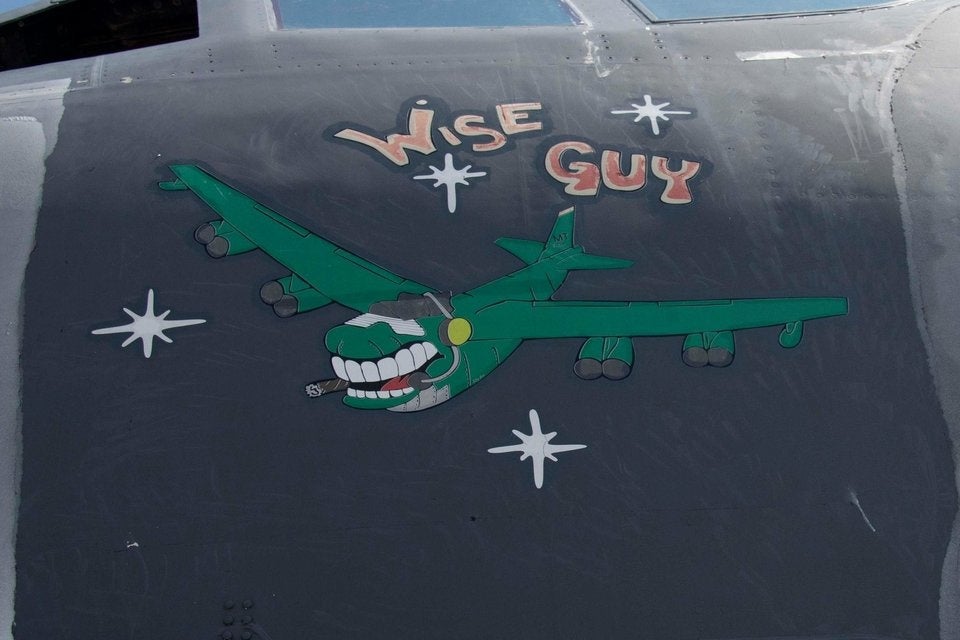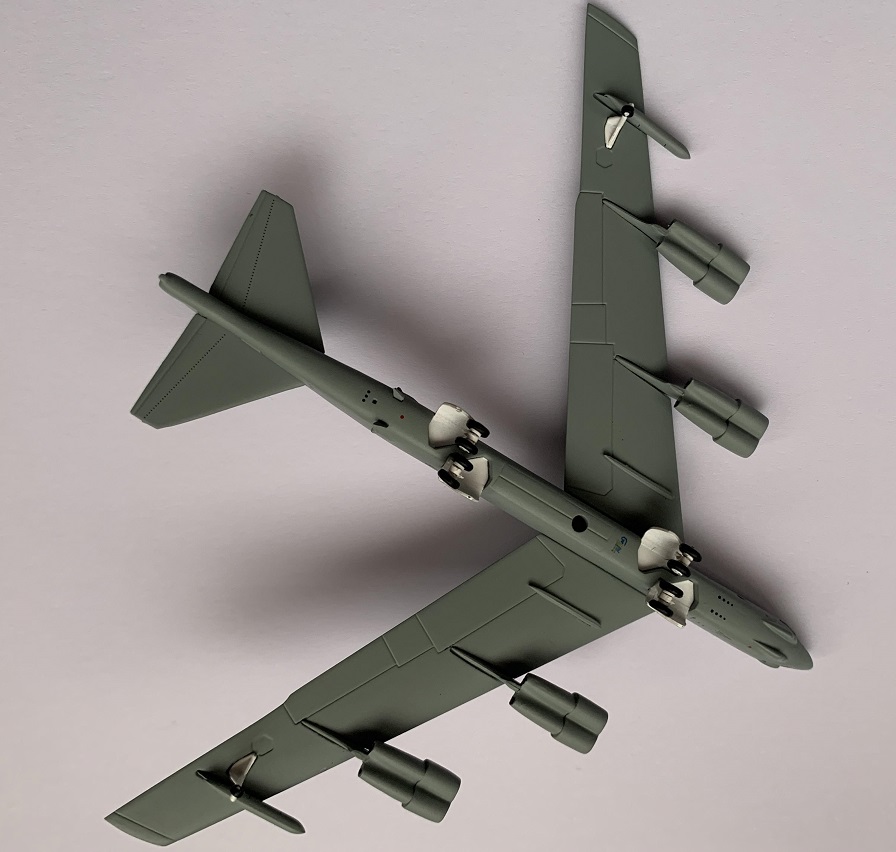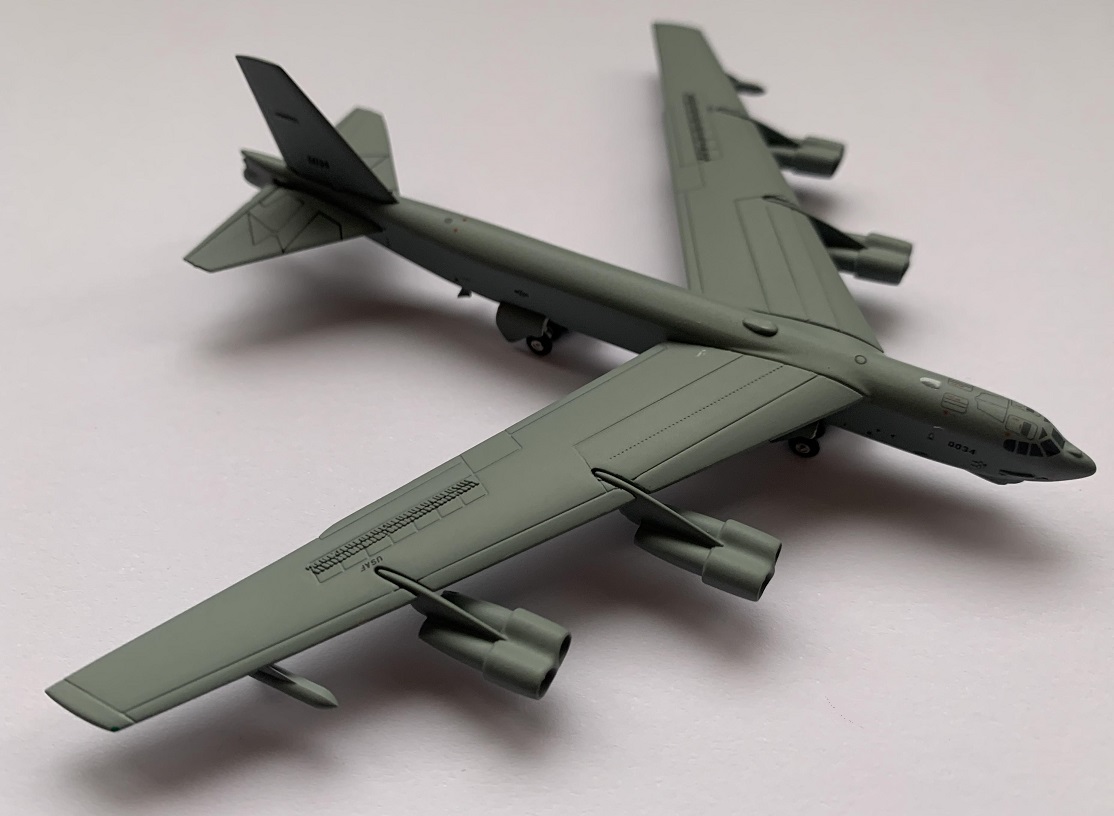Boeing B-52H Stratofortress – 60-0034 “Wise Guy”, Barksdale AFB, USAF, Louisiana, USA 2020 1/400
Add to compare1 in stock
£59.99
1 in stock
Gemini Jets 1/400 scale GMUSA112: Boeing B-52H Stratofortress 60-0034 “Wise Guy”, Barksdale AFB, USAF, Louisiana, USA 2020. The aircraft currently serves with the 5th Bomb Wing at Minot AFB, North Dakota..
Length 5 inches Wingspan 5.5 inches
B-52 nicknamed “Wise Guy” is only the second Stratofortress ever to be returned to service from the airplane cemetery known as the “Boneyard” at Davis-Monthan Air Force Base, Arizona.
Wise Guy was retired to the 309th Aerospace Maintenance and Regeneration Group (AMARG) at Davis-Monthan in 2008, where it sat under the hot sun for more than a decade. Typically, aircraft that retire there are cannibalized for parts, and the vast majority of B-52s there never fly again. But after another B-52 was consumed in a fiery, aborted takeoff at Andersen Air Force Base in Guam in 2016, the Air Force needed a replacement to keep the force at 76 aircraft, and the process of resurrecting Wise Guy began.
The B-52, which had already flown more than 17,000 hours even before it arrived at the Boneyard, needed a lot of work. Barksdale’s 307th Bomb Wing, an Air Reserve Wing, and 2nd Bomb Wing worked on Wise Guy, as well as Ghost Rider, which in 2015 became the first B-52 to be resurrected. “The jet had cracks in the rear landing gear and was missing two engines,” Master Sgt. Steven Sorge, a fuel systems mechanic for the 307th Maintenance Squadron at Barksdale, said in the release. “It also needed all its fuel cells and hoses replaced, as well as its tyres.” The list of Wise Guy’s woes didn’t end there. It also needed an overhaul of its egress system, to allow its aircrew to bail out in an emergency — but that system was in rough shape. “All of our parts for repairing the ejection seats were basically in a five-gallon bucket,” Master Sgt. Greg Barnhill, egress shop supervisor for the 307th Maintenance Squadron. “It was like putting together a jigsaw puzzle. Sorge said that a team of 13 to 20 maintainers were working on the B-52 at any given time. After all the repairs were completed on the BUFF (see below), maintainers ran a battery of tests on its engines, landing gear, fuel and egress systems to make sure it was flight worthy. The three-man aircrew then flew it “low and slow” to Barksdale. “This was a command-wide effort, with reservists and active duty offering a great deal of experience,” said Col. Robert Burgess, the commander of the 307th Operations Group, who also flew the bomber to Barksdale. “It took four months to get ready, so it was really a small effort on the aircrew side and a major effort on the maintainer side.” After the bomber arrived, Barnhill reflected on the role he played in restoring not only Wise Guy, but also Ghost Rider in 2015. “Bringing a bomber out of AMARG is once-in-a-lifetime chance, and I have been able to do it twice,” Barnhill said. “It’s just an honor to bring it back into service.” When the maintainers began their work on Wise Guy, they even found a message left in its cockpit, written in black marker on a metal clipboard: “AMARG, this is 60-034, a cold warrior that stood sentinel over America from the darkest days of the Cold War to the global fight against terror,” the note read. “Take good care of her … until we need her again.”
“Wise Guy” was returned to operational service in March 2021 with the 5th Bomb Wing at Minot AFB North Dakota.
The Boeing B-52 Stratofortress is an American long-range, subsonic, jet-powered strategic bomber. The B-52 was designed and built by Boeing, which has continued to provide support and upgrades. It has been operated by the United States Air Force (USAF) since the 1950s. The bomber is capable of carrying up to 70,000 pounds (32,000 kg) of weapons, and has a typical combat range of more than 8,800 miles (14,080 km) without aerial refuelling.
Beginning with the successful contract bid in June 1946, the B-52 design evolved from a straight wing aircraft powered by six turboprop engines to the final prototype YB-52 with eight turbojet engines and swept wings. The B-52 took its maiden flight in April 1952. Built to carry nuclear weapons for Cold War-era deterrence missions, the B-52 Stratofortress replaced the Convair B-36 Peacemaker. A veteran of several wars, the B-52 has dropped only conventional munitions in combat. The B-52’s official name Stratofortress is rarely used; informally, the aircraft has become commonly referred to as the BUFF (Big Ugly Fat Fucker/Fella)
The B-52 has been in service with the USAF since 1955. As of 2022, there are 76 aircraft in inventory; 58 operated by active forces (2nd Bomb Wing and 5th Bomb Wing), 18 by reserve forces (307th Bomb Wing), and about 12 in long-term storage at the Davis-Monthan AFB Boneyard. The bombers flew under the Strategic Air Command (SAC) until it was disestablished in 1992 and its aircraft absorbed into the Air Combat Command (ACC); in 2010, all B-52 Stratofortresses were transferred from the ACC to the new Air Force Global Strike Command (AFGSC). Superior performance at high subsonic speeds and relatively low operating costs have kept them in service despite the advent of later, more advanced strategic bombers, including the Mach 2+ B-58 Hustler, the cancelled Mach 3 B-70 Valkyrie, the variable-geometry B-1 Lancer, and the stealth B-2 Spirit. The B-52 completed 60 years of continuous service with its original operator in 2015.
The US Air Force (USAF) has contracted Rolls-Royce to provide F130 (BR725 in civil use) powerplants to re-engine its fleet of Boeing B-52H Stratofortress bombers. Announced on 24 September 2021, the initial indefinite-delivery/indefinite-quantity (ID/IQ) award is valued at USD500.9 million over six years. If all options are exercised, the value will rise to USD2.6 billion, encompassing 608 commercial engines (76 aircraft at eight engines each), spare engines, support equipment, and related data and services. The contract will be performed at the company’s Indianapolis facility in Indiana, and is expected to be completed by 23 September 2038. According to the USAF, the first two fully modified B-52s are projected to be delivered by the end of 2025, ahead of ground and flight testing. The first operational B-52s with the new engines are projected for delivery by the end of 2028, with the entire fleet modified by 2035.
The aircraft is now expected to serve at least into the 2050s.
| Weight | 0.8 kg |
|---|








